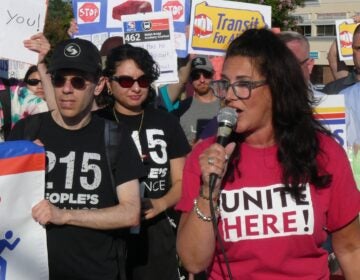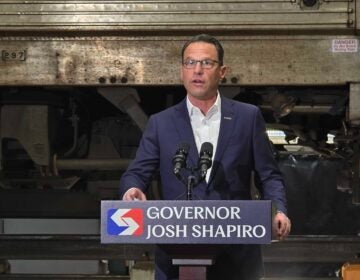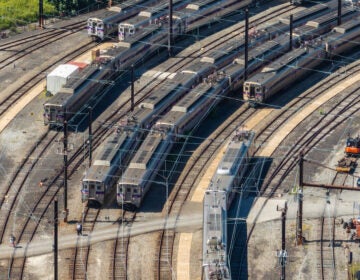How the pandemic helped birth SEPTA’s budget woes
SEPTA officials slashed their way to $30 million in savings, but they still need more than $200 million to maintain service.

The 215 People Alliance organized a protest takeover of Republican state Sen. Joe Picozzi’s office in Philadelphia to demand full funding for SEPTA, Aug. 18, 2025. (Kimberly Paynter/WHYY)
From Philly and the Pa. suburbs to South Jersey and Delaware, what would you like WHYY News to cover? Let us know!
As implementation of SEPTA’s service cuts rapidly approaches, transit officials say the agency’s budget woes didn’t happen overnight. They point to a series of issues that have put SEPTA on the precipice of a $213 million fiscal cliff.
As the COVID-19 pandemic gripped the globe in April 2020, SEPTA’s train ridership dropped to just 15% of normal capacity while bus ridership fell to 30%. Regional Rail’s ridership bottomed out in May 2020, reaching just 2% of normal capacity.
To help pay the bills during that time when hardly anyone was using the system, SEPTA got an influx of funding from the federal government. But that funding ran out a year ago, and ridership covered by the money still hasn’t returned.
SEPTA’s numbers for July show that riders have been steadily returning, but train ridership on Metro lines and Regional Rail is still only about 72% of what it was in January 2020. Bus ridership is back to 82%.
At the same time, SEPTA has been faced with increases in costs. Those include paying more for fuel, including electricity to run its vehicles, increased costs for replacement parts and other day-to-day expenses thanks to inflationary price increases.
To combat an increase in crime, SEPTA also had to add additional security forces.
“We had new challenges that we didn’t have before the pandemic,” Busch said. “Increases in the vulnerable population on the system. More need for additional policing because we did see an uptick in crime.”
The big budget gap has raised questions about the agency’s fiscal management. Busch said that SEPTA is constantly scrutinized and every penny of the agency’s spending is monitored.
“We have oversight with agencies at the state level and the federal level. So, there’s a constant examining of SEPTA’s books and our operations and everything that we do,” Busch said. “What we’ve done to try to prepare for this is tightening our belt.”
The transit agency has put its spending on a fiscal diet. Spending was cut $30 million in the past year.
“We’ve put pay freezes into effect,” Busch said. “We’re going to continue to do that and we hope that we’ll be able to get some additional assistance so that we can get service to the level it needs to be at.”
Republicans in Harrisburg like state Sen. Frank Farry, R-Bucks, have said SEPTA should be doing more to keep its financial house in order.
“When you have $50 million annually – that’s their number of fair evasions, people jumping the turnstiles – they need to get their own house in order,” Farry said during an interview Wednesday on WHYY-FM’s Studio 2. “The $50 million doesn’t solve their full structural deficit, but it obviously plays a part in it.”
Last week, the Republican-controlled Senate approved a plan that would fund SEPTA and other transportation infrastructure in the state for two years. That measure would fund SEPTA using money from the Public Transportation Trust Fund.
“The plan we have in the Senate actually takes some of the existing public transit trust fund dollars,” Farry said. “It would divert some of that funding for the next two years to fund public transit. It would get SEPTA in the clear for two years, so these cuts wouldn’t need to happen. It’s literally money sitting in a bank in Harrisburg.”
Democrats opposed the Senate plan, saying the money in that fund is already earmarked for needed system and safety upgrades. Republicans argue the fund’s remaining $1.1 billion is more than enough to cover the costs.
Earlier this month, the Democratic-controlled House approved legislation that would increase the share of sales tax revenue used for both roads and mass transit funding in the state. This would give SEPTA the money to avert service cuts.
State House Speaker Joanna McClinton, D-Philadelphia, denied arguments from Farry and other Republicans that increasing the sales tax share going to transportation would create a structural deficit in the state budget.
“We are not at a position which we were previously at when I first came to Harrisburg. … We were looking under the cushions trying to find 50 cents,” McClinton told WHYY’s Studio 2. “However, there’s now $11 billion in our rainy day fund. … We’re not going to have a structural deficit because we actually have a large savings that we can tap into.”
Even if money comes from Harrisburg to fix SEPTA’s fiscal ills, the cuts are already going on behind the scenes and can’t be easily reversed.
Busch believes it could take a week or more to restore service, and that is if SEPTA finds the funding it needs from Harrisburg.
The transit agency has vowed to work around the clock to restore service if lawmakers can work out a compromise.

Get daily updates from WHYY News!
WHYY is your source for fact-based, in-depth journalism and information. As a nonprofit organization, we rely on financial support from readers like you. Please give today.






